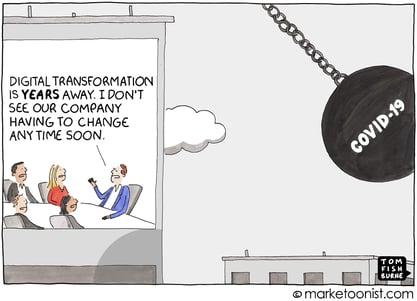When the economy enters a significant downturn, companies across the board tighten their belts and reduce spending wherever possible.
This is especially true for the construction business. During the Great Recession, the construction industry lost nearly 1.5 million jobs amid a softer demand for new homes, remodeling, and other major construction projects. While it’s too soon to say what the long-term impact of COVID-19 will be on the economy, it’s already kicked off a global recession that’s been compared to a second Great Depression. To date, 29,000 construction jobs have been lost since the start of the pandemic with no signs of slowing down.

In order to stay competitive, construction companies should always be mindful of costs and business practices that can withstand even the toughest economic circumstances.
Follow these 6 tips to make your construction business recession-proof:
- Establish processes to get paid on time. Staying on top of your construction company’s billing practices ensures your company can get paid for hard work and project planning even when others fall on hard times. Be sure to send timely invoice reminders, preliminary notices, and progress payment bills to make sure clients stick to firm payment deadlines. Site management software can help distribute invoices automatically and get documents electronically signed so crucial payment notices don’t get “lost in the mail.”
- Review budgets line-by-line. To save yourself from having to make hard choices once a recession hits, do your best to always keep lean and efficient books. Take time to comb through your construction budget to identify potential areas of waste, such as oversized building systems, installation costs, or low-efficiency equipment, which can affect your long-term bottom line. Reducing unnecessary labor hours or material costs can also help smooth out the edges of a bloated budget and implement solid project cost control. Running a tight fiscal ship year-round can help ensure that when crunch time arrives, your construction business will be ready.
- Streamline office productivity. Reducing overhead in the office isn’t just an easy way to cut costs — it’s a great way to squeeze more efficiency out of the work your employees are already doing. Workflow management software can play a big part in the cosntruction collaboration process, making it simple to review documents, sign contracts, and search for projects from years past for auditing purposes. Digitizing old files allows users to access information anytime, anywhere, and — when coupled with real-time data analytics software — construction companies can automatically extract better data out of information that used to live exclusively on pen and paper.
- Focus on customer service. Building strong relationships with your subcontractors and customers is one of the best long-term strategies to keep projects coming down the pipeline. Promptly handle customer requests, communicate frequently, and consider extending discounts or payment plans to top clients to establish a friendly rapport that demonstrates you value their business. Chicago-based construction firm Skender, for example, is offering to match prices on domestic products like flooring that were originally sourced from abroad but have suddenly become unavailable. Actions like that can ensure the business continues well after the immediate crisis ends.
- Increase your cash cushion. Establishing a rainy day fund is a good way to prepare for storm clouds appearing on the horizon. Collecting on overdue accounts, filing mechanics liens, or negotiating longer payment terms with material suppliers or banks can help your company keep as much cash on hand as possible. The Small Business Administration’s Paycheck Protection Program can also help construction businesses get up to $10 million if forgivable loans to cover payroll and utility expenses.
- Do what you know best. When it comes to recession-proofing your construction business, there’s wisdom to staying in your lane. Servicing a new region, experimenting with new materials and methods, and embarking on projects outside of your scope of expertise can carry hidden costs and risks that could pose a serious long-term threat to the health of your company. Focus on offering best-in-class construction services specific to your company’s niche and invest in risk management plan for construction.
Recessions may come and go, but smart business practices are timeless. Eliminating waste, streamlining operations, and providing top-notch customer service can help ensure that business can continue when the financial world takes a turn for the worse. Running a streamlined, customer-focused construction business can go a long way toward ensuring that work gets done, your labor is productive and bills get paid.






